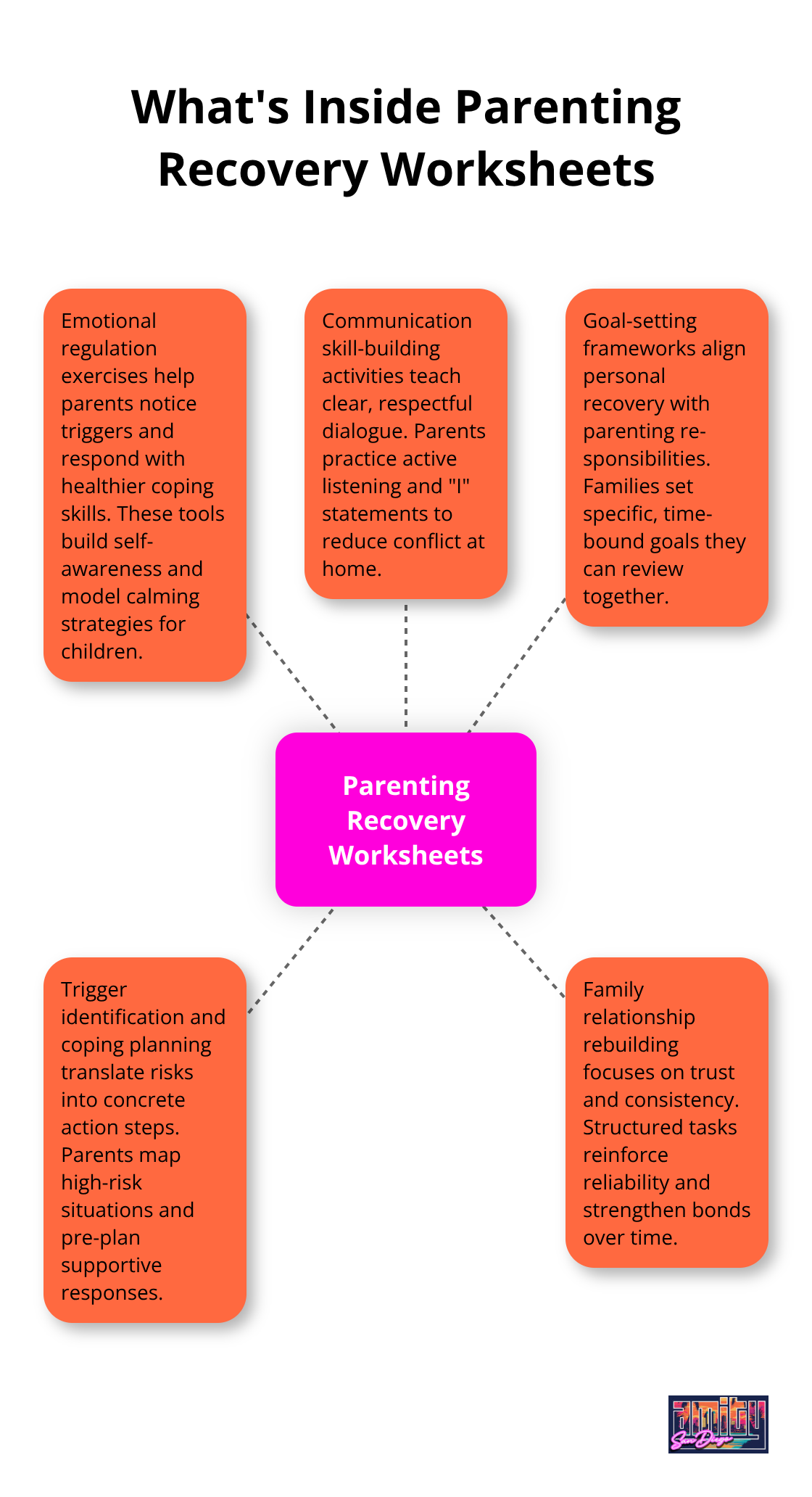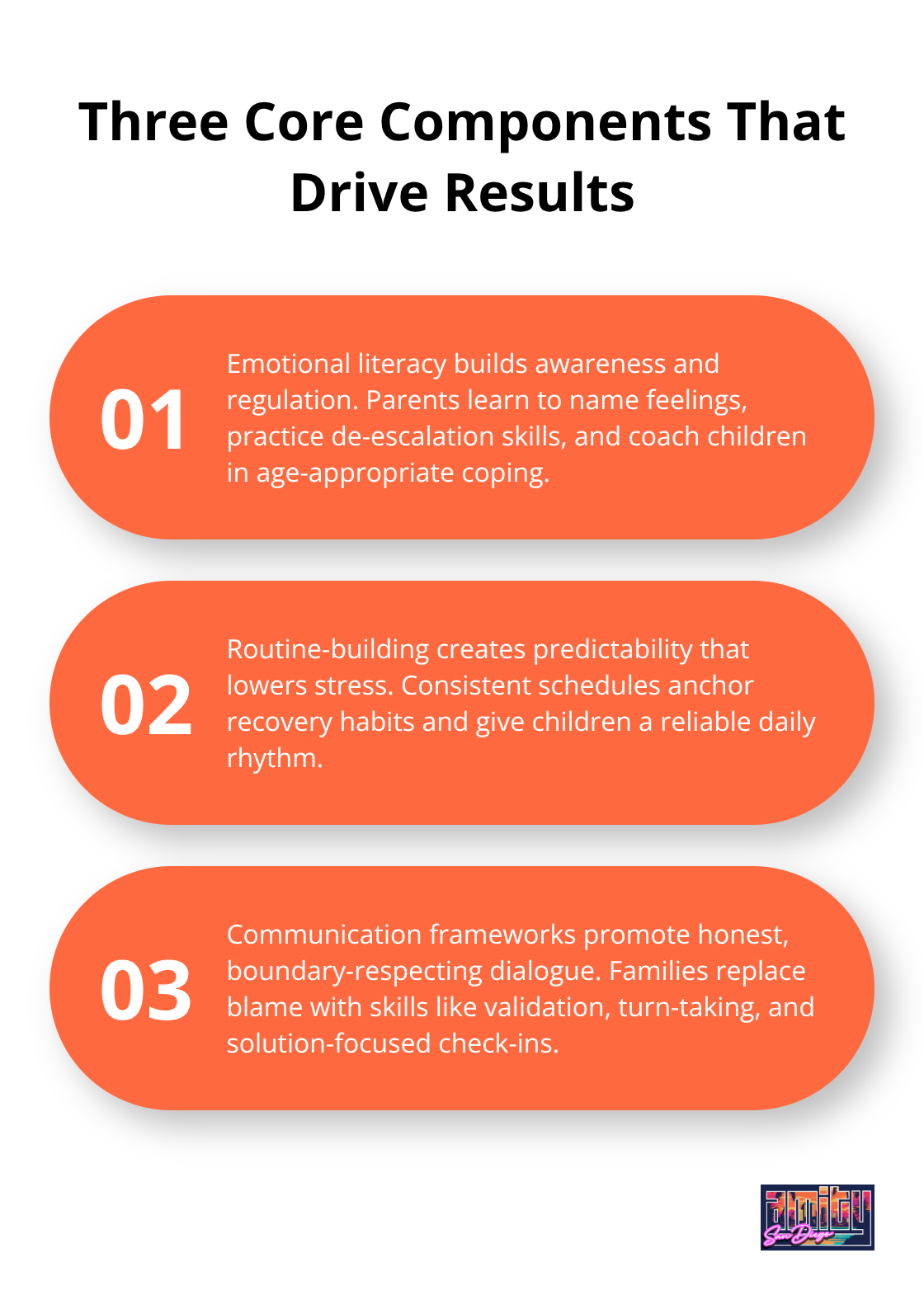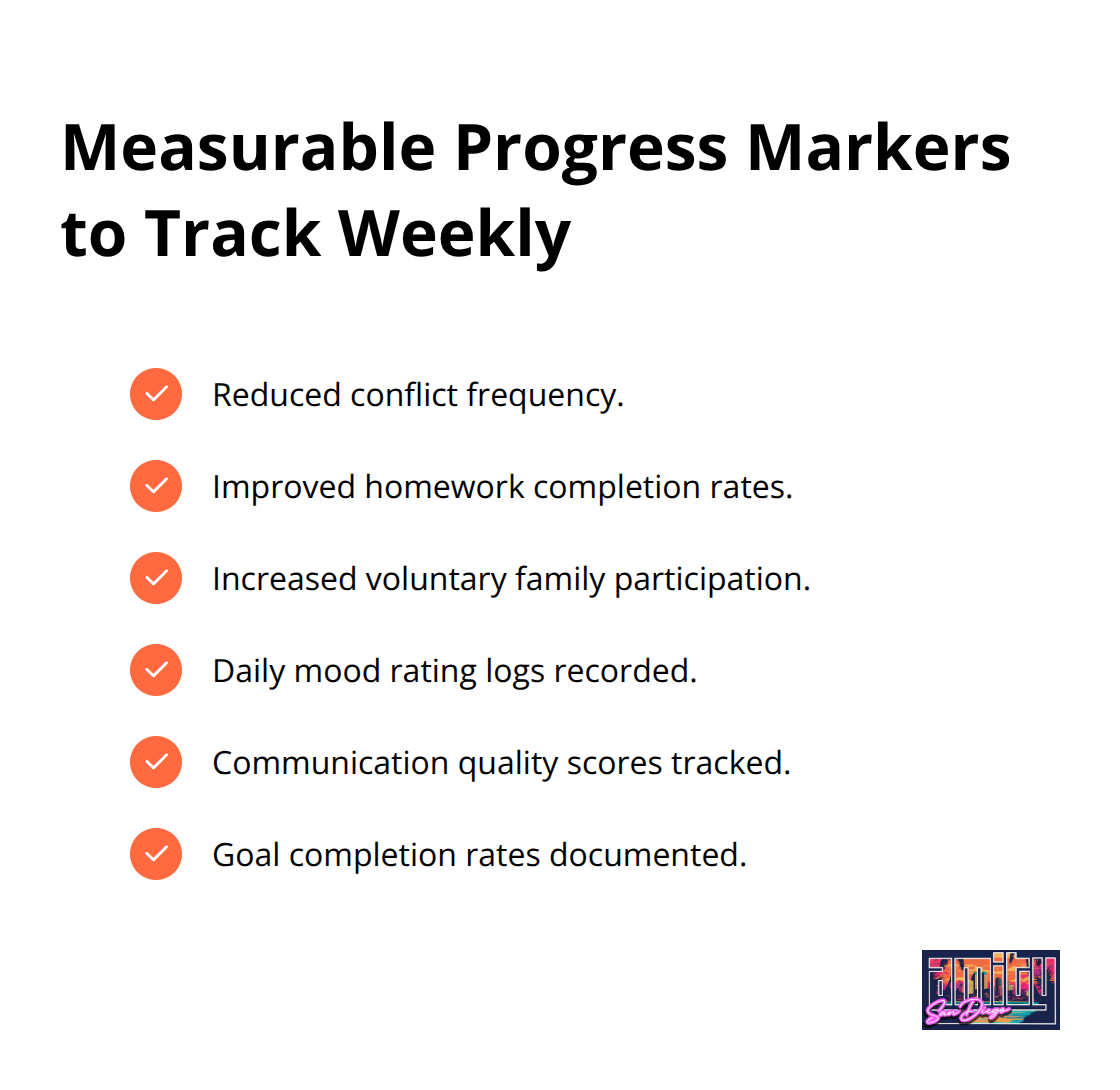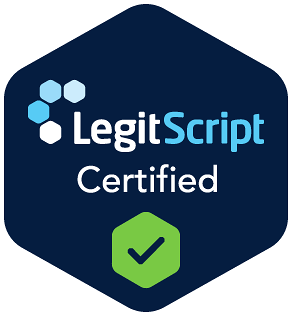Recovery from addiction while raising children presents unique challenges that require specialized support tools. Parenting in recovery from addiction worksheets offer structured guidance for parents navigating this complex journey.
We at Amity San Diego understand that these worksheets provide practical frameworks for rebuilding family relationships and establishing healthy routines. They help parents develop essential skills while maintaining their recovery progress.
What Are Parenting Recovery Worksheets
Parenting recovery worksheets are structured assessment and activity tools that target parents who work through addiction recovery while they raise children. These evidence-based resources combine cognitive-behavioral therapy techniques with practical parenting strategies. They help parents identify triggers, develop coping mechanisms, and rebuild family relationships. The Substance Abuse and Mental Health Services Administration reports that family involvement in recovery improves treatment outcomes significantly.

The worksheets typically include sections for emotional regulation exercises, communication skill-building activities, and goal-setting frameworks that address both personal recovery needs and parenting responsibilities.
Core Components That Drive Results
The most effective worksheets focus on three essential areas that directly impact family stability. First, they target emotional literacy through exercises that help parents recognize and manage their feelings while they teach children age-appropriate coping strategies. Research shows that parents who actively participate in their recovery process improve their parenting efficacy measurably. Second, these tools emphasize routine-building activities that create predictability for children (studies indicate this reduces behavioral problems in families affected by addiction). Third, they incorporate communication frameworks that promote honest dialogue about addiction while they maintain appropriate boundaries. Many programs now integrate technology-assisted approaches to support family recovery efforts.

Practical Applications for Daily Family Life
These worksheets transform abstract recovery concepts into actionable daily practices through specific exercises like cost-benefit analysis activities. Parents evaluate the pros and cons of their past behaviors while they set concrete family goals. SMART Recovery provides particularly effective worksheets that focus on motivation and address coping behaviors through structured self-assessment tools. Parents use these resources to establish healthy boundaries, practice positive communication techniques with “I” statements, and develop support networks within their communities. The worksheets also include mindfulness and relaxation exercises that promote emotional resilience for both parents and children. For comprehensive support, consider exploring addiction treatment San Diego options.
Implementation Strategies That Work
Parents achieve the best results when they approach these worksheets with consistent daily practice rather than sporadic use. The most successful families dedicate 15-20 minutes each day to worksheet activities, often during quiet evening hours when children can participate age-appropriately. Parents should select worksheets that match their current recovery stage and family dynamics. Early recovery often requires simpler exercises focused on basic emotional recognition, while later stages can handle more complex family communication activities that address deeper relationship patterns and long-term goals.
How Do You Build a Sustainable Recovery Routine
Success with parenting recovery worksheets depends entirely on establishing non-negotiable daily routines that integrate seamlessly into family life. The most effective approach involves parents who set aside 20-30 minutes during consistent time slots when children naturally accept structured activities. Morning routines work best for families with school-age children, while evening sessions suit parents with toddlers who nap during the day. Research shows that parents who maintain consistent schedules experience better work-family balance and report stronger family bonds within six months.
Match Activities to Your Child’s Development Stage
Worksheet effectiveness drops dramatically when activities don’t match children’s cognitive abilities. Parents with children ages 3-6 should focus on simple emotion identification exercises that use visual aids like feeling faces and basic coloring activities that teach coping skills. Children ages 7-12 respond well to structured journal prompts and role-play scenarios that address family communication patterns. Teenagers require more sophisticated worksheets that tackle complex topics like trust rebuilding and future planning (parents often make the mistake of using age-inappropriate materials, which creates frustration and resistance). The Parent SMART intervention study demonstrates the effectiveness of multi-component approaches for families dealing with substance misuse challenges.
Create Measurable Progress Markers
Progress tracking requires specific, observable behaviors rather than vague emotional improvements. Parents should document concrete changes like reduced conflict frequency, improved homework completion rates, or increased voluntary family participation. Weekly family meetings provide structured opportunities to review worksheet outcomes and celebrate specific achievements.

The most successful families use simple tracking sheets that record daily mood ratings, communication quality scores, and goal completion rates. Research indicates that consistent progress tracking supports sustained behavioral regulation and long-term motivation in family intervention programs.
Overcome Common Implementation Barriers
Many parents abandon worksheet routines when they encounter initial resistance from children or feel overwhelmed by the time commitment. The key lies in starting small with 10-minute sessions and gradually expanding as the family adapts to the new structure. Parents should expect pushback during the first two weeks and prepare simple rewards for participation rather than perfect completion. Flexibility becomes essential when life circumstances change – successful families adjust their schedule rather than abandon the practice entirely. Building self-esteem and developing coping strategies through consistent practice prepares families to maximize the long-term benefits that structured parenting tools offer throughout the recovery process. For comprehensive support, consider exploring addiction treatment San Diego options that integrate family-based approaches.
How Structured Parenting Tools Transform Family Recovery
Structured parenting worksheets create measurable improvements in family dynamics through three fundamental changes that occur within 30-60 days of consistent use. Parents report improved communication quality when they implement daily worksheet routines, according to research from family-based recovery interventions. These tools work because they replace chaotic family patterns with predictable structures that children desperately need during parental recovery periods.
Communication Breakthroughs That Rebuild Trust
The worksheets force parents to practice specific communication techniques like active listening and emotion validation, which children recognize as genuine efforts to rebuild damaged relationships. Parents learn to use “I” statements instead of blame language, while children develop vocabulary to express their feelings safely. Research shows that communication within families serves as both a risk and protective factor for mental health outcomes. Children respond positively when parents demonstrate consistent effort through worksheet completion (this visible commitment often matters more than perfect execution).
Accountability Systems That Drive Real Change
The accountability component drives lasting behavioral changes because worksheets create written records of daily family interactions, mood patterns, and goal achievements. Parents track concrete metrics like conflict frequency, homework completion rates, and positive family activities, which eliminates the guesswork from recovery progress. Research demonstrates the importance of family involvement across the continuum of substance use disorder treatment and recovery.
Early Warning Systems That Prevent Crisis
The documentation process helps parents recognize triggers before they escalate into family crises, while children gain confidence when they see their parents take measurable steps toward stability. Parents identify patterns in their emotional responses and develop specific strategies to address high-risk situations before they spiral out of control. This systematic approach transforms abstract recovery concepts into daily practices that strengthen family bonds and create the structure necessary for long-term sobriety success. For comprehensive support, consider exploring addiction treatment San Diego resources.
Final Thoughts
Parenting in recovery from addiction worksheets deliver measurable benefits that transform family dynamics through structured daily practices. These evidence-based tools help parents rebuild trust, develop healthy communication patterns, and create accountability systems that support long-term sobriety success. Parents who dedicate 15-20 minutes each day to worksheet activities report stronger family bonds and improved emotional regulation within six months.
Professional support amplifies these benefits when it provides guidance on age-appropriate exercises and progress methods. The journey forward requires commitment to both personal recovery and family restoration. Parents should start with simple exercises that match their current recovery stage and gradually expand their practice as the family adapts (structured approaches create lasting changes in family relationships).
We at Amity San Diego recognize that recovery affects the entire family system. Our comprehensive programs integrate family-focused approaches with evidence-based treatment methods. Taking the first step toward structured parenting support can transform your family’s recovery journey through addiction treatment San Diego resources that create the stability your children need during this challenging time.



